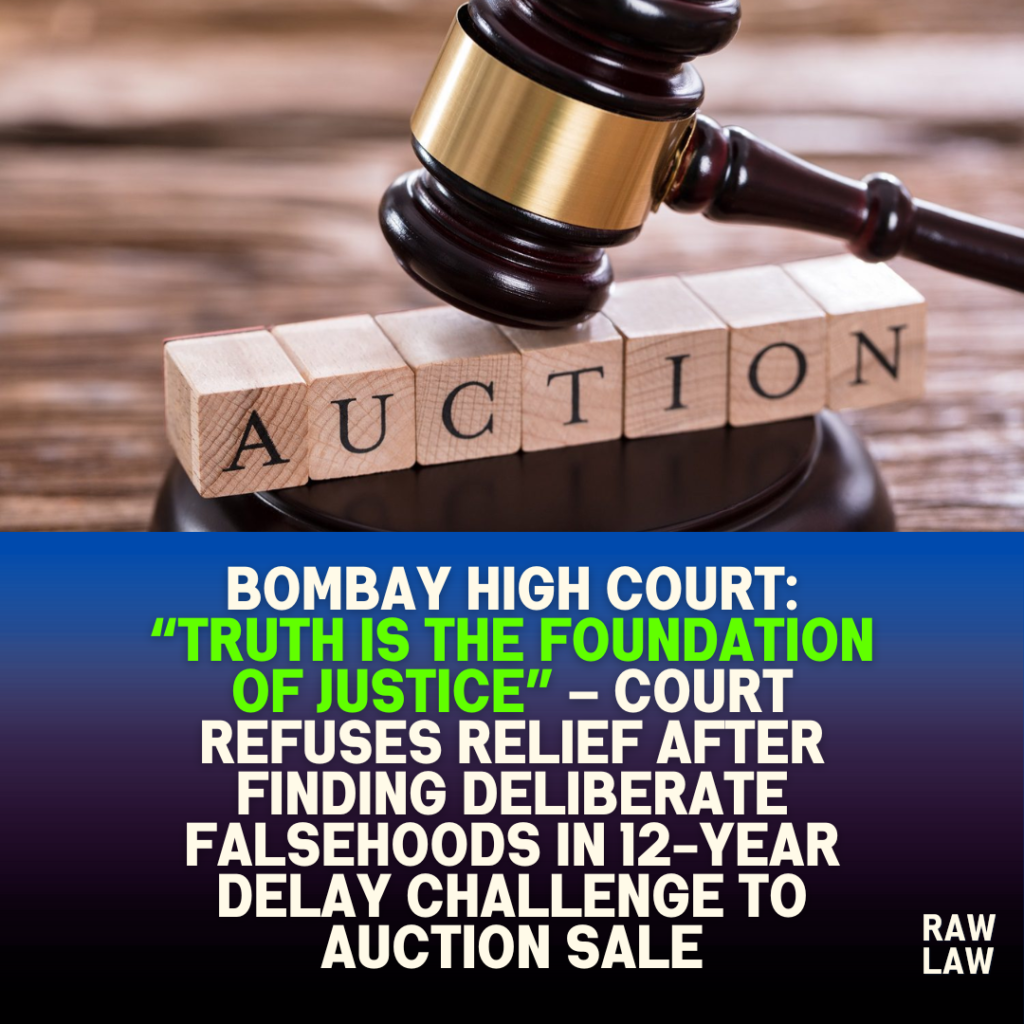Court’s decision
The Bombay High Court dismissed the writ petition challenging the refusal to condone a 12-year delay in filing a revision against the confirmation of a cooperative bank auction sale. The Court held that the petitioners had deliberately suppressed facts, filed false statements on oath, and attempted to mislead both the Revisional Authority and the High Court. Emphasising that writ jurisdiction is discretionary and equitable, the Court rejected the petition without entering into merits and imposed ₹1,00,000 costs for misuse of judicial time.
Facts
The petitioners had mortgaged two properties and availed loans in 2005. After defaults, recovery certificates under Section 101 of the Maharashtra Cooperative Societies Act were issued in 2007 for substantial dues. An auction was held in August 2009, leading to the sale of both properties.
The petitioners claimed they were unaware of the auction until November 2020, and therefore filed a delayed revision under Section 154 seeking to set aside the sale. However, the record showed that as early as 2011, they had obtained account extracts showing auction proceeds deposited, and in 2015, they addressed a written communication acknowledging the auction. They nevertheless filed an affidavit asserting they learnt of the auction only in 2020. The Revisional Authority refused to condone the 12-year delay.
Issues
- Whether the petitioners were entitled to condonation of a twelve-year delay in filing a revision against the auction sale.
- Whether a litigant who suppresses material facts and makes false statements is entitled to relief under Article 226.
- Whether the High Court should interfere with the Revisional Authority’s findings in view of the petitioners’ conduct.
Petitioner’s arguments
The petitioners argued that the auction was void ab initio because the auction purchasers allegedly failed to deposit the 15% and 85% instalments within the timelines mandated by Rule 107(11)(g) and (h) of the Maharashtra Cooperative Societies Rules, 1961. They contended that a void sale can be challenged “at any stage” without limitation.
They submitted that they had no knowledge of the auction until November 2020 and therefore the limitation period should commence from that date. Relying on the principle that void actions are non est, they contended that the Revisional Authority erred in refusing to condone the delay.
Respondent’s arguments
The respondents highlighted that the petitioners’ plea of lack of knowledge was demonstrably false. They pointed out that in September 2011 the petitioners had requested and received account extracts showing the auction proceeds. In April 2015, the petitioners themselves wrote to the Bank acknowledging the auction and adjustment of proceeds.
The respondents submitted that the petitioners made false statements on oath, thereby abusing the writ jurisdiction. Citing binding precedents, it was argued that writ relief must be denied where the litigant suppresses facts or misleads the Court. They urged dismissal with costs to prevent misuse of judicial time.
Analysis of the law
The Court reiterated that writ jurisdiction under Article 226 is discretionary, equitable, and founded upon the principle of clean hands. Suppression of material facts, misrepresentation, and untruths strike at the root of the judicial process.
The Court emphasised that the petitioners’ version was contradicted by their own documents from 2011 and 2015. The plea of delayed knowledge was therefore a deliberate attempt to mislead the Court.
Writ courts are not bound to examine merits where the foundational premise of the petition is false. When the petitioner approaches the Court with unclean hands, the jurisdiction itself is refused.
Precedent analysis
1. Amar Singh v. Union of India
The Supreme Court held that litigation is not a game of chess, and parties must make truthful disclosures. Suppression or misrepresentation disentitles a litigant from relief. The High Court relied heavily on this principle, noting that the petitioners attempted to gain advantage through falsehood.
2. Prestige Lights Ltd. v. State Bank of India
The Supreme Court reaffirmed that writ jurisdiction is equitable and must be denied when a party suppresses material facts. Courts must protect judicial processes from deceit.
3. In Re Kensington Income Tax Commissioners
This English decision, consistently approved by Indian courts, holds that when a litigant approaches the court ex parte but suppresses facts, the court may refuse relief entirely.
4. Shamrao Ramu Kamble
The Bombay High Court held that non-disclosure of relevant litigation and false statements are sufficient grounds to dismiss a writ petition without examining merits. The Court applied the same reasoning here.
Court’s reasoning
The Court conducted a detailed factual evaluation and concluded that the petitioners’ story was inconsistent with their own documents. Their 2011 account extract and 2015 communication established clear knowledge of the auction.
The Court observed that false statements on oath are not inadvertent errors but deliberate attempts to mislead the Court. This conduct “strikes at the root of justice” and makes it impossible for the Court to extend discretionary relief.
The Court further emphasised that judicial time is a public resource, and misuse of court time harms genuine litigants waiting for their matters to be heard. Since the petitioners consumed more than 90 minutes of judicial time on a petition built on falsehood, costs were warranted.
Conclusion
The High Court held that the petitioners were guilty of deliberate suppression and falsehood, rendering them ineligible for any discretionary relief. The refusal to condone the 12-year delay was upheld. The petition was dismissed with ₹1,00,000 costs, payable to the Maharashtra State Legal Services Authority, failing which the amount would be recovered as arrears of land revenue. The request for continuation of interim relief was also rejected.
Implications
This judgment reinforces the principle that truthful disclosure is the cornerstone of writ jurisdiction. It warns litigants that courts will not tolerate manipulation, suppression, or strategic concealment. The decision strengthens judicial discipline by ensuring that litigants cannot misuse constitutional remedies to reopen decade-old proceedings through false narratives. It also underscores the increasing judicial trend of imposing realistic costs to deter abuse of process.



